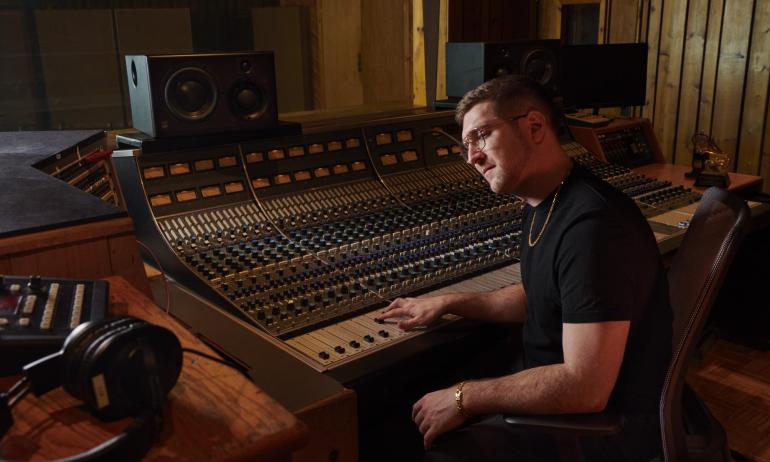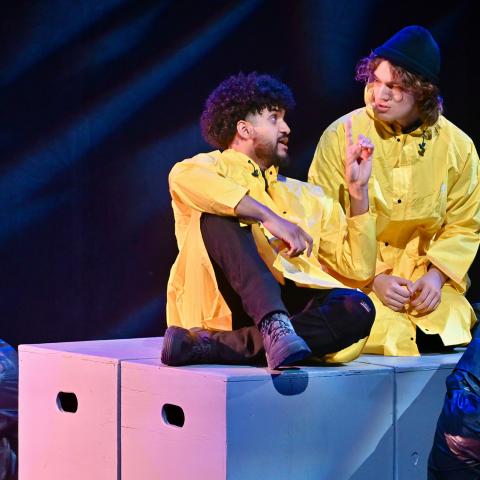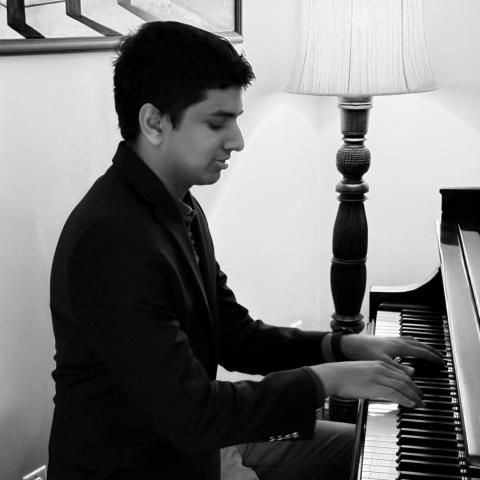Precious Perez Draws Musical and Academic Inspiration from Agua de Valencia
Precious Perez
Image courtesy of Precious Perez
Each semester, dozens of Berklee students swap their Berklee IDs for passports, traveling across the ocean to study at Berklee’s campus in Valencia, Spain. Located on the country’s east coast, Valencia is a vibrant, friendly city known for its musical richness. Berklee Valencia offers four master’s degree programs, classes for undergraduates who spend either a semester or their first year in Valencia, and summer programs focusing on performance, opera, and symphonic bands.
Precious Perez spent a semester at Berklee Valencia in the fall of 2017. A dual major in vocal performance and music education, Perez is a visually impaired singer-songwriter, guitarist, and ukulele player who found both academic and creative inspiration there. Last summer, she released a four-song EP titled Agua de Valencia, which draws deeply on her time in Spain. We spoke to Perez about how her experience has helped her grow as a person and a musician.
What made you want to study abroad in Valencia?
I have some family friends who moved to Valencia a few years ago, and when I was considering colleges, they told me Berklee had a campus there. I knew I definitely wanted to study abroad. I wanted to immerse myself in another culture.
How did you prepare for your semester abroad?
I’m Puerto Rican and I speak Spanish, but I didn’t have the confidence I wanted to have. I ended up taking a Spanish class at Berklee to brush up on my skills before I went. I was really excited to go somewhere completely new and experience things I would otherwise never experience.
What did you enjoy about the Berklee Valencia experience?
Boston is so busy. It’s overwhelming—a running-around kind of busy. Valencia was the same amount of busy, but it didn’t feel that way. It’s a smaller campus, and you really get to connect with people. There are master’s students and undergraduate students, and you really get to know people. The staff members were all so nurturing. I got to know the staff really well because of my accessibility issues, so I was always dropping by the offices to say hi.
At the time, I was still taking my core classes, so I took some basics: ear training, harmony, jazz standards, psychology, Latin jazz ensemble. I had a class on Spanish culture and society, which was really cool. The teachers were wonderful—so energetic and passionate about what they do.
Did you participate in any programs outside of your classes?
Yes! I took advantage of every opportunity that semester. I was part of the UN Ambassador program. I did events in the community—I was part of an event on Disability Day. I performed at the Fall in (Love With) Valencia concert, which featured Berklee students playing at the Bancaja Cultural Centre. I wanted to immerse myself in everything that was offered. I ended up pulling together a band from friends I made within a week to perform at the Fall in Love showcase.
What was it like to be a blind student in Valencia?
I wasn’t sure how accessible the city or the campus would be. It’s an entirely different country, and I didn’t know what to expect.
The first week was interesting because we had to go to a lot of different places for orientation, and I couldn’t really do that independently. My family friends ended up helping me with a lot of those events. There was no Braille signage anywhere in the Berklee residence hall, so I had to count doors at first. We ended up putting a Braille label on the doorjamb of my room so that I could find it. And Chi Kim, who runs Berklee’s assistive music technology lab in Boston, went to Valencia to set up an accessible workstation in case I needed to use it with my screen readers.
What were the challenges to getting around town?
One of the biggest obstacles was navigating Valencia itself. They don’t have talking or beeping walk lights at crosswalks. I did work with an orientational mobility instructor, but I never felt safe crossing streets by myself. As I made friends, I was able to get around town with them. I also used a taxi service—I would send a message ahead to help the driver find me. It was empowering to know I had a way to get somewhere if I had to.
What was the approach to accessibility like in Spain?
I found the attitude very different from the U.S. In the States, people see a blind person, and they think, “You poor thing!” The attitude in Spain was more like, “I can see you need help—tell me how I can help you.” Not everybody has to know or understand how to do things, but the willingness to help, and listen to the person, makes all the difference. I was surprised at how open everyone was—both at Berklee and in the city.
A lot of people in the blind community say that independence equals doing everything yourself. But everyone’s definition of that is different. For example, I love interacting with people. If I need help and I get to meet somebody because of that, and they become my friend—that’s great. That’s one of the best parts of asking for help.
Your song “Agua de Valencia,” the title track on your EP, is inspired by your time there—are the other songs on your EP as well?
Yes, “Agua de Valencia” just came to me one day. I was up all night making the demo for it. I showed it to my harmony professor Dani Flors. He added some chords to make it more interesting. Another professor, Sergio Martínez, was always encouraging us to bring things we’d written into class, and try them out. So I did, and everyone was playing with my song. It was so cool to collaborate on something that came from my experience there.
I had gotten a few more song ideas while I was there, and I brought them back home. I thought it would be a perfect time to make an EP, and focus on my Spanish side. We had Sergio play the percussion on it; he recorded the tracks in Valencia and sent them to me and my producer. My Berklee friends who were in my band played on it as well, and my fiancé—he’s a percussionist. The EP is inspired by my roots and Spain, and Berklee Valencia. Everyone has been so supportive of it.
Listen to "Agua de Valencia":
Do you have plans to return?
I was there last July—I actually got engaged in Valencia, at the residence where I’d been staying. None of this would have happened without Valencia, as far as my Berklee career and my personal life. It’s incredible.
What would you say to students who are considering studying abroad, but are nervous or intimidated by the prospect or the language barrier?
I think it’s normal to be nervous and a little bit afraid, especially for someone who’s never been out of the country. I’ve flown a lot and I’d been around the States by myself, but an entirely different country was a new thing for me. It’s normal to feel that fear and wonder how you’re going to do it on your own. But I think part of life is taking risks, and this is a risk that’s entirely worth it because it will give you so much more.
When you study abroad, you have to learn how to speak up for yourself and figure things out. Especially as someone with additional challenges, I’ve always been taught to advocate for myself, but in Valencia I really had to speak up and explain why something wasn’t working. I needed to know that I had that support—the Student Affairs team were so understanding and I felt so comfortable with all of them. It was a really powerful moment for me: I realized that I can do things on my own, and I can accomplish anything I want to. I think that’s something that study abroad brings out in people.
People in Valencia are also very patient with students who are trying to speak Spanish. As long as you’re making an effort, people are very kind. All the staff at Berklee Valencia are so wonderful and supportive. I think it’s important for people to know they have that support.
Learn more about Berklee Valencia and see photos of the campus at valencia.berklee.edu.




